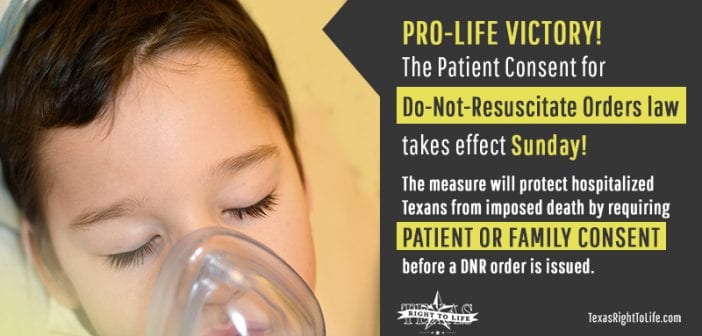This Easter Sunday, April 1, 2018, the reforms enacted by the Texas Legislature in 2017 regarding Do-Not-Resuscitate Orders (DNRs) for hospitalized patients take effect. The new law, Senate Bill 11 from the First Called Special Session of the 85th Texas Legislature, rectifies some of the pernicious medical ethics policies in Texas law. Due to the tireless efforts of state Senator Charles Perry (R-Lubbock) and Representative Greg Bonnen, M.D., (R – Friendswood), hospitalized patients will now be protected from forced or secret DNRs.
While serving as patient advocates in hospitals across the state, Texas Right to Life found that hospital personnel wrote DNRs for patients without consent of the patient and even wrote such orders contrary to the expressed wishes of patients and their families. Texas law has been silent on “in-hospital” DNRs, leaving room for health care facilities to unilaterally make this life and death decision. In other words, physicians and medical personnel could write a DNR for a patient based on the quality of life value judgments of the physician or personnel, rather than based on the directives or values of the patient, whose life is at stake, with the elderly and individuals with disabilities as most susceptible to discrimination. Many patients were unaware that DNRs had been placed in their medical records, regardless of the fact that the DNR may contradict their directives. Senate Bill 11 will change this by requiring patient or surrogate consent before a doctor or hospital personnel can issue a DNR.
Texas Right to Life spearheaded the efforts to pass this new law to protect vulnerable patients in Texas hospitals, and SB 11 is a culmination of years of studying and crafting the most protective policy. The House sponsor, Representative Bonnen, a neurosurgeon, authored House Bill 2063 during the Regular Session of the 85th Texas Legislature, but the vicious games of House leadership killed the bill. HB 2063 was referred to the House Committee on State Affairs, chaired by Straus henchman Byron Cook (R-Corsicana); Cook demanded that the bill be watered down to appease interest groups whose priority is not the protection of Life. Such stakeholders included the lobbyist for the Texas Catholic Conference of Bishops and anti-Life organizations like the Texas Hospital Association (THA), Catholic Hospital Association (CHA), and Texas Medical Association (TMA). However, Cook’s stall tactics were successful, and the bill died when House leadership placed the bill on the House calendar too close to passage deadlines.
After Governor Greg Abbott called a special session to address myriad issues, including DNR reform, Dr. Bonnen and Senator Perry were stunned to learn that the stakeholders who previously approved the language in HB 2063 retracted their support. However, neither was deterred; they again painstakingly negotiated a consensus bill with Governor Abbott’s help. Governor Abbott signed the bill into law last summer.
Texas law is now clear on “in-hospital” DNRs, addressing the issuance, revocation, notification, limitation of liability, and criminal and administrative penalties for physicians ignoring this decision by patients and their families. Although the DNR gap in Texas law is closed, other patient protections are needed.
Even with the passage of SB 11, Section 166.046 of the Texas Health and Safety Code explicitly permits involuntary euthanasia of hospitalized Texans. This section of law, referred to as the “10 Day Law” or “Futile Care Law” outlines the process for a physician to withdraw or withhold life-sustaining treatment against the wishes of patients or their families, provided the hospital’s own committee agrees. If the patient or their family cannot secure a transfer to another facility or another physician within 10 days, basic life-sustaining treatment can be legally removed, which inevitably speeds the death of the patient. This statutory process grants unprecedented unilateral authority to hospitals and physicians to impose quality of life value judgments on vulnerable patients. To build on the protections enacted in SB 11, this “10 Day Law” must be repealed and replaced with Pro-Life language requiring physicians to honor the directives and wishes of a patient or surrogate regarding medical care.
Until then, Texas Right to Life will continue to fight for the rights of vulnerable patients. On Easter Sunday, the Pro-Life movement in Texas will celebrate the significant step toward that goal when SB 11 goes into effect.


